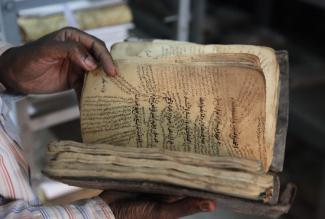Summer Special
Timbuktu – a story of heroes and myths

Founded in the 12th century, Timbuktu developed into an important trading centre by the 14th century, due to its location as a hub between river trade on the Niger river and caravan routes through the Sahara desert. Merchants and caravan leaders spoke of immeasurable wealth and roofs made of gold.
The colonial powers Britain and France competed to find Timbuktu for years. They hoped to unveil the secret of the city – and exploit its wealth. In search of the desert city, daredevil pioneers embarked on long trips many times, but kept failing to reach their destination. René Caillié, a Frenchman, finally made it to Timbuktu dressed as an Arab in 1828. He saw mud buildings and dusty paths, but no golden roofs. Europeans did not believe him at first.
Only 25 years later could Heinrich Barth, a German explorer, confirm Caillié’s reports. However, Barth soon discovered a completely different wealth. It had actually been mentioned earlier by Alexander Gordon Laing – a Brit, who got lost during his expedition. In a letter in 1826 he wrote about old manuscripts and collected writings that cast a completely new light on West African history.
Until then, Europeans had assumed that “ignorant savages” lived in the continent’s interior. The ancient manuscripts proved that traditions of writing had existed for centuries. Chronicles showed that Timbuktu had developed from a caravanserai to a centre of Islamic scholarship since the medieval period. The manuscripts were mainly Arabic texts. They dealt with a wide range of topics, including astronomy, medicine, history, religion and poetry. There were many legal documents too. Many manuscripts were privately owned by various families. A proper research institute was only set up in 1973 with UNESCO support with the mission of collecting and documenting these precious artefacts.
When Islamist militias conquered the city in 2012, this treasure was in great danger. In January 2013, the mayor of Timbuktu informed the world that some of the age-old manuscripts had been burned. Charlie English, then head of international news at the British newspaper the Guardian, quit his job, planning to get to the bottom of the story and to write a book about it. The book was published in 2017.
English did extensive research and met Abdel Kader Haidara, a librarian. In a spectacular rescue operation, Haidara in cooperation with several colleagues and other scholars, did their best to smuggle the valuable manuscripts out of the city. English’s book reads like an adventure novel. It tells the story of the book rescue and the history of the city in two parallel strands.
Haidara and his supporters managed to acquire international funds, procured boxes, crates and barrels, and eventually smuggled the historical documents out of the city. They hid them under food on pick-up trucks or shipped them on boats past Islamist checkpoints on a small local river. With every trip, they risked their lives once more. According to Haidara, they managed to transfer 377,491 documents from Timbuktu to the safety of Bamako, Mali’s capital. Only a few writings fell victim to the Islamists.
At the very end of the book, English admits that the real number of rescued manuscripts may actually have been smaller than claimed. However, the smaller number hardly diminishes the merit of the rescuers – and it fits the reputation of a city of many legends.
Book
English, C., 2017: The book smugglers of Timbuktu. The quest for this storied city and the race to save its treasures. London, Harper Collins.








